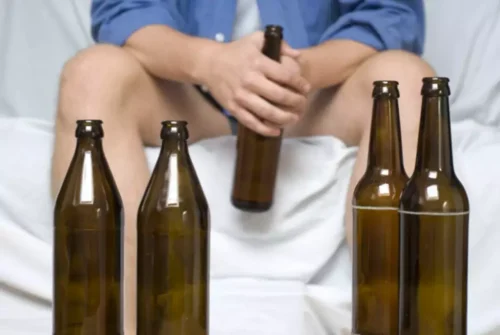
Working with a medical professional to taper your alcohol consumption can help the likelihood and severity of alcohol withdrawal symptoms. Instead of quitting alcohol cold turkey, you can steadily reduce your consumption so that your body has time to gradually readjust to absence of alcohol. It’s important to note that stopping drinking can be dangerous and even life-threatening. It’s vital to speak with a medical professional before you begin weaning off alcohol to ensure you have a plan to do so safely.

Read this next
With kindling, the brain becomes increasingly sensitized to stopping alcohol. In turn, you can suffer https://ecosoberhouse.com/ from increasingly severe withdrawal symptoms every time you try to stop drinking. If you suddenly quit drinking, your brain can start to make more of an excitatory substance called glutamate. This excessive glutamate level can lead to alcohol withdrawal symptoms, which can be dangerous. The idea of detoxing or tapering is to prevent the more severe withdrawal effects.

Practical Solutions: Addressing Challenges in Alcohol Tapering
- It can mean more time for your other interests, and even new interests.
- Start by estimating how much you drink on a daily basis—and be honest with yourself.
Some people can taper quickly and quit alcohol completely, while others may take longer. But deciding to cut back on drinking is much more important than the length of your alcohol taper. Despite its benefits, there are some important drawbacks when considering tapering off alcohol. That is why healthcare professionals discourage people from attempting tapers. Instead, doctors and nurses encourage them to quit cold turkey with their help.
Tapering vs Cold Turkey
Generally speaking, alcohol home detox is neither the most effective nor the safest method of quitting alcohol. However, it may be suitable for someone with a lower risk of experiencing alcohol withdrawal, or a person who has access to medical professionals at home. For a safe recovery from heavy drinking, have a plan in place. Quitting abruptly can be dangerous without medical supervision due to potential withdrawal symptoms.
When I was down and super depressed, talking about my experiences on there helped get me through and made me feel less alone. If you’re cross-addicted to harder drugs like stimulants or opiates, you need to stop using those. Experience has shown me most people who continue using other hard substances simply get high and then continue drinking. Don’t quit other lighter substances while you’re detoxing from alcohol.
Delirium tremens (DTs) can begin 48 hours after your last drink and last up to five days. Between five and 25 percent of people with DTs don’t survive. Repeatedly recognized as Newsweek’s best treatment center in California, they offer highly personalized, non-12-Step care using evidence-based and holistic approaches.
Getting Ready
Alcohol dependence can lead to fatal outcomes, with rising death rates linked to excessive alcohol use, as reported by Psychology Today. This condition not only affects individuals but also has profound social and economic impacts on families and society at large. Ark Behavioral Health offers 100% confidential substance abuse assessment and treatment placement tailored to your individual needs. About 10 percent of people experience more severe symptoms, such as fever, fast breathing, and heavy sweating. Give your loved ones as much information as you can about your self-tapering strategy. Let them know your plan, your progress, and how withdrawals are going for you.
- The success of these strategies will depend on how much you drink and what you drink.
- This can help your body adjust, and it can be easier to manage than quitting cold turkey.
- The amount of alcohol it takes to cause withdrawal symptoms can vary from person to person.
- But if you’re living with alcohol use disorder, drinking is more than a habit.
The severity ranges from mild to severe, with both physical and psychological symptoms indicating its presence. Excessive alcohol use, as highlighted by the Centers for Disease Control and Prevention (CDC), poses significant health risks such as injuries, violence, liver diseases, and cancer. This condition most often occurs when someone who has long-term alcohol dependence stops drinking cold turkey. But if heavy drinkers cut back on their average number of drinks too quickly, they may be at risk of life-threatening withdrawal symptoms. Weaning off alcohol in a safe way can help reduce the severity of some withdrawal symptoms.

Alcohol and Cialis: Risks, Side Effects & Treatment

As a result, quitting alcohol might become more dangerous than necessary. Quitting drinking poses many challenges, including cravings and psychological dependence on alcohol. Social pressures and habitual drinking settings can also make quitting difficult. However, trained addiction professionals can help you overcome these challenges using proven techniques. If you’ve been drinking for a long time, tapering off can cause withdrawal Sobriety symptoms. Getting professional help can mitigate harmful withdrawal symptoms and ensure success.
Does Tapering Help Reduce Withdrawal Symptoms?
Tapering or weaning means ramping down your alcohol use until you get to zero—or to a more moderate level of drinking that you prefer. That said, tapering off alcohol doesn’t completely eliminate withdrawal symptoms. Alcohol withdrawal is dangerous and it’s important to be careful throughout the process. Make sure you have access to medical care and how to taper off alcohol social support.